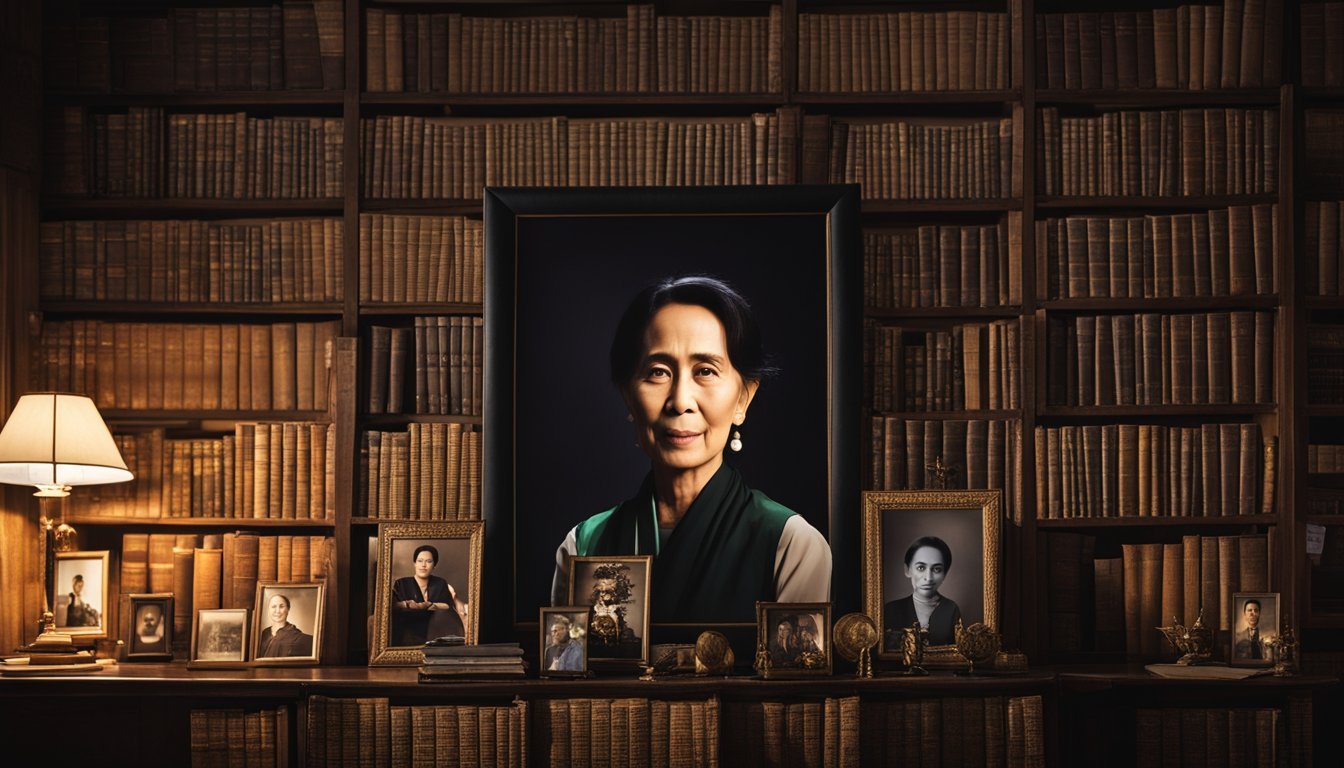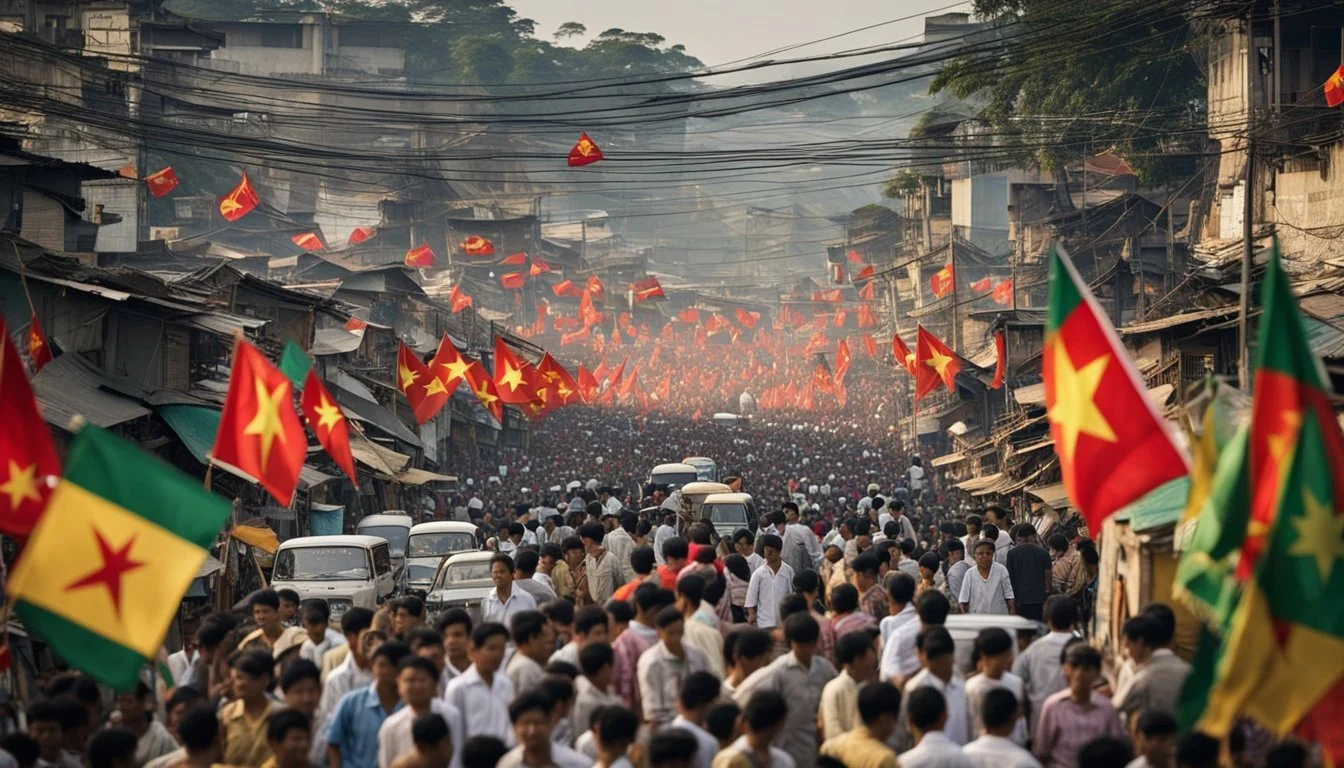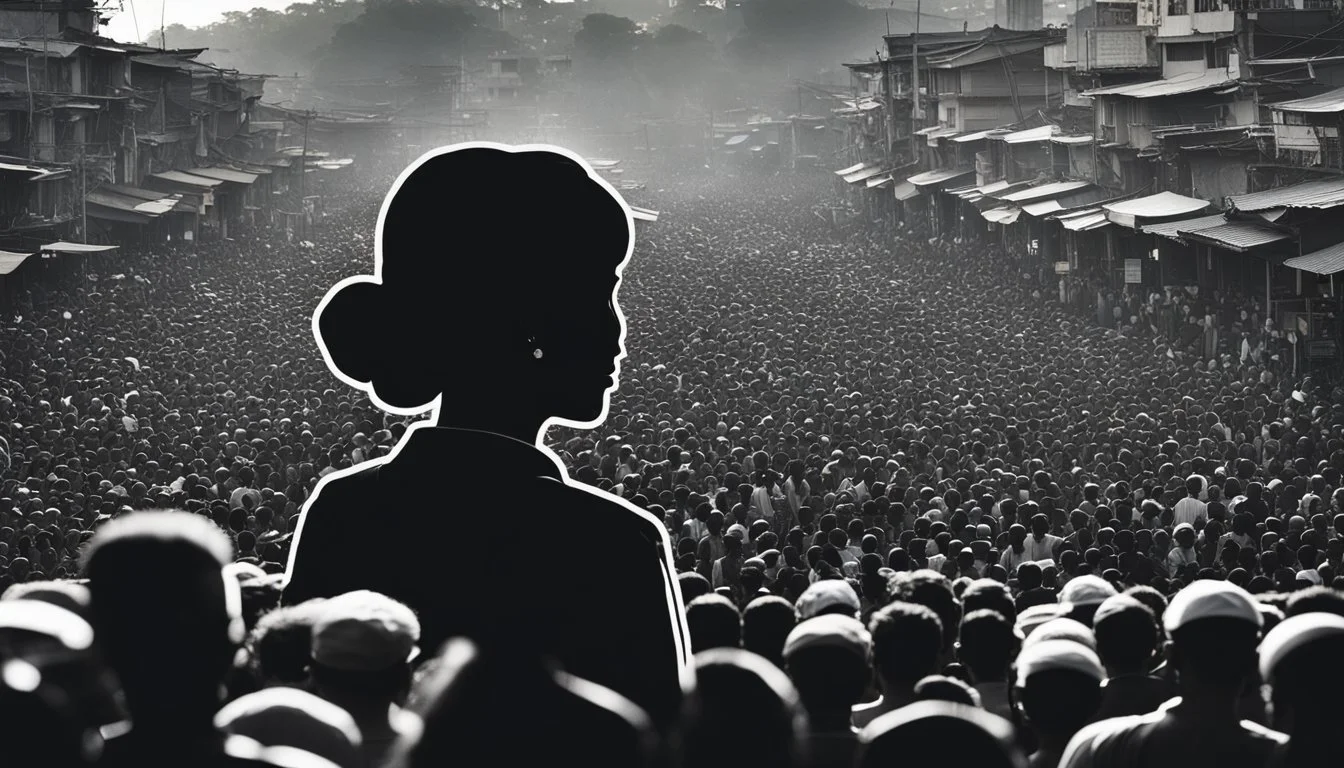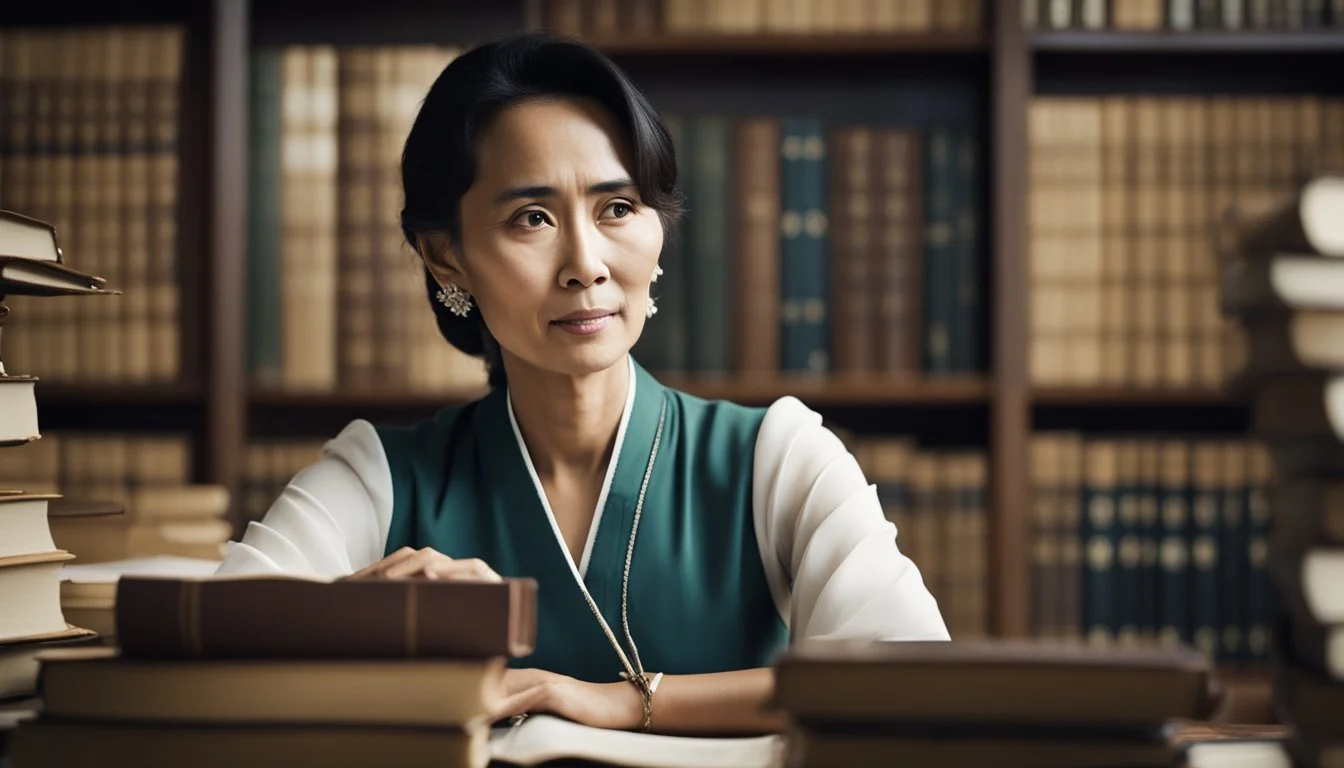8 Documentaries on the Political Career of Aung San Suu Kyi
Insightful Watchlist
Aung San Suu Kyi's political career has spanned decades, marked by her steadfast commitment to democracy and human rights in Myanmar. Known as a symbol of resistance against military dictatorship, she remains a controversial figure who has navigated complex political landscapes.
This article showcases eight documentaries that provide insight into her journey, highlighting her impact on Myanmar's political scene. Through these films, viewers can explore the various aspects of her leadership, challenges, and the broader implications of her work on the global stage.
1) The Lady and the Peacock: The Life of Aung San Suu Kyi (2012)
"The Lady and the Peacock: The Life of Aung San Suu Kyi" is based on Peter Popham's biography of the same name. This documentary offers an in-depth look into the life and political journey of Aung San Suu Kyi, a Nobel Peace Prize laureate.
The film explores her transformation from a shy daughter of Burma's national hero, Aung San, to an international symbol of democracy and nonviolent resistance.
Narrated by various experts and featuring interviews with those who knew her, the documentary provides valuable insights into her struggles and triumphs. It also highlights the political volatility in Burma and how Suu Kyi's leadership played a pivotal role.
Renowned figures such as Archbishop Desmond Tutu have praised the work as a masterly narration, making it a must-watch for anyone interested in the political history of Burma.
More information can be found on IMDb.
2) Aung San Suu Kyi: Lady of No Fear (2010)
Aung San Suu Kyi: Lady of No Fear is a 2010 documentary directed by Anne Gyrithe Bonne. This film traces the life of Aung San Suu Kyi, focusing on her role as a central figure in Myanmar's pro-democracy movement.
The documentary delves into her transition from a British housewife in Oxford to a key political opposition leader in Burma. It captures her two decades of house arrest and unwavering commitment to human rights and democracy.
Interviews and archival footage highlight her personal and political struggles. The film also features appearances by her husband, Michael Aris, and other notable figures.
For more information, visit the IMDb page.
3) They Call It Myanmar: Lifting the Curtain (2012)
"They Call It Myanmar: Lifting the Curtain" provides an intriguing look into Myanmar, the country formerly known as Burma. Directed by Robert H. Lieberman, this documentary was shot clandestinely over two years.
The film explores Myanmar's political landscape under a restrictive military regime. This gives viewers a rare glimpse into one of the world's most isolated countries.
While the documentary focuses broadly on the country's political climate, it also touches upon Aung San Suu Kyi's role. Her influence in the fight for democracy in Myanmar is sometimes highlighted.
For those interested in understanding Myanmar's political history, this film is vital. Its narrative merges the personal struggles of the Burmese people with the broader political context.
More information can be found here.
4) The Only Real Game: Myanmar (Burma)
The Only Real Game: Myanmar (Burma) (2018) focuses on the critical moments of the political career of Aung San Suu Kyi.
This documentary highlights her journey from being a symbol of hope for democracy to facing significant challenges.
Created by director Robert Hillmann, the film showcases Suu Kyi's persistent efforts and the tumultuous political landscape of Myanmar.
The work serves as a visual narrative of her years of house arrest and her return to politics amidst various obstacles.
With interviews, archival footage, and expert commentary, the documentary provides a comprehensive glance at her impact and the political scenario in Myanmar.
It aims to present an objective view of her career, making it a valuable resource for understanding the complexities of her leadership.
For more information: IMDB
5) Aung San Suu Kyi: Icon of Hope
Aung San Suu Kyi is often regarded as a symbol of resilience and democracy for many in Myanmar and around the world. Her early years were marked by a legacy; she is the daughter of Myanmar's independence hero, General Aung San.
Her personal sacrifices and house arrests have further solidified her image as an unyielding crusader for freedom. The world watched as she transitioned from an imprisoned dissident to a figure in elected office following her release in 2010.
Documentaries typically capture her early journey, marked by her fight against Myanmar's military junta. These films often portray her as the beacon of hope that inspired global support for Myanmar's pro-democracy movement.
The depiction in various media has reinforced her stature as a moral leader. These films examine the myriad challenges she faced, balancing the expectations of a global audience and the realities within Myanmar.
A major focus has always been her powerful speeches and the quiet determination that attracted worldwide admiration. Through these documentaries, viewers can witness how she garnered the support of millions despite the perils that came with defying an authoritarian regime.
Each documentary uniquely captures the complex layers of her personality and political navigations. These films serve as educational resources, providing nuanced perspectives on her role in shaping Myanmar's modern history.
For further details about Aung San Suu Kyi's portrayal in documentaries, readers can explore various informational resources such as Wikipedia or IMDB.
6) Roadmap to Democracy: Burma in Transition
This documentary explores Burma's (Myanmar) complex journey towards democracy, spotlighting significant events and key figures involved. It discusses the 50-year military dictatorship that preceded the country's shift towards democratic governance.
A central focus is on the "roadmap to democracy," a seven-step plan introduced by General Khin Nyunt in 2003. Critics noted its lack of definitive deadlines, while supporters viewed it as a beacon of hope for gradual political reform.
Aung San Suu Kyi's role is also examined. After spending years under house arrest, she eventually became a symbol of democratic aspirations for the Burmese people. Her leadership transition marked a crucial period in the nation's history.
The documentary provides insights into the challenges and milestones of this roadmap, capturing the highs and lows of Burma's democratic transition. It highlights international reactions, including calls for more credible and inclusive processes by entities such as the United Nations.
For more information, visit IMDb.
7) A Journey of Grace: Aung San Suu Kyi's Fight for Freedom
Aung San Suu Kyi, a Nobel Prize laureate, has been a prominent figure in the quest for democracy in Burma (Myanmar). Her political career has been marked by her dedication to non-violent resistance and her steadfast commitment to human rights.
This documentary explores the various stages of her journey. It delves into her early life, her influence from her father, General Aung San, and her education abroad, which shaped her political and personal principles.
A significant focus is on her return to Burma in 1988, where she became the leader of the National League for Democracy (NLD). The documentary examines how she spearheaded the non-violent movement, despite facing house arrest and severe restrictions from the ruling military junta.
The film also highlights her international recognition, including the Nobel Peace Prize in 1991 and the Sakharov Prize for Freedom of Thought. These accolades underscore her impact on the global stage and the international support for Burma's fight for democracy.
Key interviews and rare archival footage provide insights into her strategies, struggles, and the sacrifices she made for her nation. The documentary paints a comprehensive portrait of her unwavering grace under pressure and unyielding spirit.
For more information on the documentary, visit IMDb (year not specified).
8) The Unfinished Story of Suu Kyi
The legacy of Aung San Suu Kyi is complex and not yet fully written. With her early years marked by her father's assassination, Suu Kyi's political involvement began in earnest in 1988. As a leader of the non-violent human rights and democracy movement in Burma, she gained international attention and was awarded the Nobel Peace Prize.
Despite her significant contributions, Suu Kyi's leadership has faced sharp criticism, particularly for her handling of the Rohingya crisis. While her government promised democratic reforms, her silence on military actions against the Rohingya tarnished her global reputation. This controversy has prompted many to reconsider her role as a human rights icon.
Documentaries such as "Lady of No Fear: Aung San Suu Kyi's Journey From Family to Power" (2013) YouTube, and "Aung San Suu Kyi - Lady of No Fear" (2011) IMDb, explore these contrasting aspects of her career. These films provide a nuanced view of her life's work and her influence on Burma's political landscape.
Her story remains unfinished, as future events will likely continue to redefine her legacy. Suu Kyi's impact on Burma and her place in history remain dynamic and evolving, reflecting the ongoing struggle for democracy in her homeland.
Early Life and Education of Aung San Suu Kyi
Aung San Suu Kyi was born into a politically significant family and pursued academic excellence across multiple countries, shaping her into the leader she would become.
Family Background
Aung San Suu Kyi was born on June 19, 1945, in Rangoon, Burma. She is the daughter of Aung San, a revered independence hero, and Khin Kyi, a prominent diplomat.
Her father, Aung San, played a crucial role in negotiating Burma’s independence from British colonial rule before being assassinated in 1947. Khin Kyi later became a significant figure in Burmese politics, serving as an ambassador to India and Nepal.
This political environment profoundly influenced Suu Kyi’s early views and ideals.
Academic Journey
Suu Kyi's education began in Rangoon before she moved to India with her mother when Khin Kyi was appointed ambassador. She attended high school in New Delhi, where she was exposed to various political ideas and cultures.
She later attended the University of Oxford, where she studied philosophy, politics, and economics (PPE) at St Hugh's College. During her time there, Suu Kyi broadened her perspective on global issues and fortified her political beliefs.
After her undergraduate studies, she pursued a further degree in Burma, adding to her deep understanding of her country's political landscape.
Political Rise and Achievements
Aung San Suu Kyi's political journey significantly shaped Myanmar’s modern political landscape. Her activities centered around promoting democracy and her pivotal roles in crucial national events.
Founding the National League for Democracy
In 1988, Aung San Suu Kyi co-founded the National League for Democracy (NLD). The party emerged during a period of political turmoil and civil unrest in Myanmar. Suu Kyi, inspired by the democratic principles upheld by her father, Aung San, sought to bring about non-violent political reforms.
The NLD quickly gained widespread support among the citizens who were yearning for change. As General Secretary of the NLD, Suu Kyi became the face of the movement for democracy. Her speeches and writings emphasized human rights and a transparent government. Her tireless advocacy and moral authority earned her international acclaim, as well as the Nobel Peace Prize in 1991 while she was under house arrest.
1990 General Elections
The 1990 General Elections were a landmark in Myanmar's political history. Under the leadership of Aung San Suu Kyi, the NLD contested the elections with a clear mandate for democratic reform. Despite her house arrest, the NLD managed to secure a landslide victory, winning approximately 80% of the parliamentary seats.
However, the military junta refused to recognize the results and continued their grip on power. This blatant disregard for the election results further highlighted the oppressive nature of the regime. Nonetheless, the election solidified Suu Kyi’s status as a leading figure in the fight for democracy and brought international attention to Myanmar's political struggles. Her stance drew widespread condemnation of the junta’s actions and bolstered global support for the NLD.
Challenges and Controversies
Aung San Suu Kyi's political career faced significant obstacles, including prolonged house arrest and sharp international condemnation for her stance on critical issues.
Period of House Arrest
Aung San Suu Kyi spent nearly 15 years under house arrest between 1989 and 2010. Her detention was primarily due to her opposition to Myanmar's military junta, which viewed her as a threat to its rule.
During her confinement, Suu Kyi was isolated from her family, allowed few visitors, and denied regular communication with the outside world. Despite these restrictions, she remained a symbol of resistance, garnering worldwide admiration for her nonviolent struggle for democracy.
Her imprisonment drew widespread international attention, leading to global campaigns for her release. Yet, the prolonged isolation took a toll on her health and personal life, underscoring the severe measures employed by the regime to stifle dissent.
International Criticism
After her release and subsequent political rise, Aung San Suu Kyi faced intense scrutiny on the global stage, particularly regarding the Rohingya crisis. In 2017, Myanmar's military conducted a violent crackdown against the Rohingya Muslim population, leading to mass displacement and allegations of genocide.
Suu Kyi was widely criticized for her silence and perceived complicity in the face of these human rights violations. Her defense of the military's actions at the International Court of Justice further fueled disapproval from the international community.
This controversy tarnished her global image as a human rights icon and led to the revocation of several honors, including the Freedom of the City awards from various international municipalities.
Legacy and Impact
Aung San Suu Kyi's political career has significantly influenced both Myanmar’s path to democracy and the global perception of human rights. Her legacy is marked by her contributions to democratic movements and her renowned global influence.
Contributions to Democracy
Aung San Suu Kyi is recognized for her unwavering commitment to establishing democracy in Myanmar. She began her political journey in 1988, leading the non-violent struggle for human rights and democratic reforms. As the leader of the National League for Democracy (NLD), she has spent numerous years under house arrest, symbolizing the sacrifices made for political freedoms.
Her role in the 2015 elections was pivotal. The NLD secured a landslide victory, demonstrating her impact and the people's desire for democratic governance. Her leadership has driven significant legislative changes and opened dialogue for political freedom and human rights, although challenges persist.
Global Influence
Globally, Aung San Suu Kyi has been an icon of non-violent resistance and democratic struggle. She received the Nobel Peace Prize in 1991, which solidified her status as a global symbol for peace and human rights. Her efforts have inspired many activists and political leaders around the world.
Despite controversies and criticisms regarding her later political decisions, her early contributions to human rights and democracy continue to be lauded internationally. Her legacy remains complex, reflective of her significant yet contentious role on both the national and global stages.








